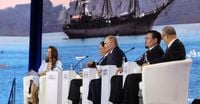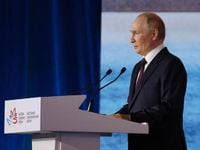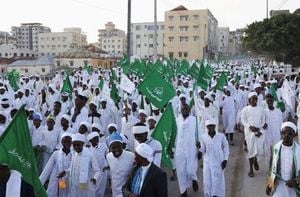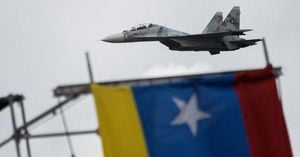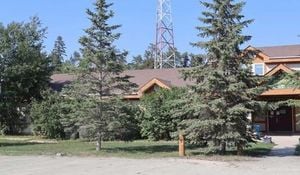Russian President Vladimir Putin has issued a stark warning to the West, declaring that any foreign troops sent to Ukraine would become "legitimate targets" for Russian military action. The warning, delivered on September 5, 2025, comes on the heels of a significant international development: more than two dozen countries, led by France and Britain, have formally pledged to provide security guarantees for Ukraine once the war ends. These guarantees include the deployment of a multinational force by land, air, and sea, as well as assets in cyberspace and financial support.
The Paris summit, hosted by French President Emmanuel Macron and attended by Ukrainian President Volodymyr Zelenskyy, saw 26 nations agree to participate in a "reassurance force" designed to patrol Ukraine and deter any renewed Russian aggression. Macron emphasized that these troops would not be deployed on the front lines but would serve as a buffer to "prevent any new major aggression." He stated, "The ground troops would not be deployed on the front line, but be there in a bid to prevent any new major aggression." While the exact number of troops remains undisclosed, Zelenskyy confirmed an agreement for "thousands" of personnel, noting, "It will definitely not be single digits, but in the thousands. And that is a fact, but it is still a little too early to talk about it."
Putin, speaking at the Eastern Economic Forum in Vladivostok, dismissed these Western security guarantees and reiterated his position that foreign troops in Ukraine—especially during active conflict—would be seen as hostile. "If some troops appear there, especially now during the fighting, we proceed from the premise that they will be legitimate targets," he warned. He further argued that such deployments would not contribute to lasting peace, insisting that Ukraine's growing military ties with the West were among the "root causes" of the ongoing conflict, which began with Russia's invasion in February 2022.
The Kremlin's stance was echoed by spokesperson Dmitry Peskov, who declared the Paris summit's proposals "definitely not" acceptable to Moscow. "We would recognise it as a threat to ourselves—the presence of international forces, or any foreign forces, or NATO forces on Ukrainian soil, near our border," Peskov told reporters, underscoring Russia's deep-seated anxieties about NATO expansion.
From Kyiv, the response was swift and dismissive. Ukrainian foreign ministry spokesman Georgiy Tykhy retorted, "He's not the one to decide. Putin has made a mistake by deciding that he can place his troops across the border in Ukraine, and now it is none of his business whom Ukraine invites to its territory to protect its security." For Ukraine and its allies, the deployment of Western troops is seen as a crucial step toward any peace deal, ensuring that Russia cannot simply regroup and re-invade in the future.
Despite the flurry of diplomatic activity, the prospects for a genuine peace agreement remain dim. Putin offered to host peace talks in Moscow, but Zelenskyy flatly rejected the idea, calling it a "non-starter." He explained, "We are ready for any kind of meetings. But we don’t feel that Putin is ready to end this war. He can speak but it’s just words, and nobody trusts his words." Putin himself admitted, "It will be practically impossible to reach an agreement with the Ukrainian side on key issues."
The Paris summit marked a new push by European leaders—particularly France and Britain—to show they can act independently of the United States, especially as questions swirl around the extent of U.S. involvement. President Donald Trump, who recently met with both Putin and Zelenskyy, has repeatedly stated that there will be "no U.S. boots on the ground" in Ukraine. However, Trump has left open the possibility of providing air support and other forms of assistance, saying U.S. backing could "probably" come in the form of air power. Following a call with European leaders, Trump said he would speak with Putin soon, a conversation that Kremlin officials indicated could be arranged quickly.
For Moscow, the only acceptable framework for Ukraine's security remains the so-called Istanbul agreements of 2022. Under these provisions, Ukraine would abandon its NATO ambitions and adopt a neutral, nuclear-free status in exchange for security assurances from the U.S., Russia, China, Britain, and France. However, Ukraine and its Western partners have pointed to Russia's repeated violations of past agreements, particularly between 2014 and 2022, when Moscow-backed separatists fought Ukrainian forces in the east.
Western leaders remain skeptical of Russia's intentions, suspecting that Moscow is simply playing for time as it seeks to consolidate control over occupied Ukrainian territories. The war, now in its forty-second month, has already led to the illegal annexation of five Ukrainian regions by Russia, though only Crimea remains fully under Moscow's control. Tens of thousands have died, millions have been displaced, and much of eastern and southern Ukraine lies in ruins—the bloodiest conflict Europe has seen since World War II.
Amid this grim backdrop, NATO Secretary General Mark Rutte made it clear that Russia has no say in Western decisions about troop deployments in Ukraine. "Why are we interested in what Russia thinks about troops in Ukraine? It's a sovereign country. It's not for them to decide," he told reporters. UK Prime Minister Keir Starmer echoed this sentiment, declaring that Western allies now have an "unbreakable pledge" to Ukraine, backed by the United States, and must continue to press Russia to end the war.
German Chancellor Friedrich Merz emphasized that the immediate priority is to secure a ceasefire at a summit with Zelenskyy, after which "strong security guarantees" would be put in place. The concept of a reassurance force, modeled in part on historical ceasefires like the demarcation line between North and South Korea, is seen by some European officials as a powerful deterrent against future Russian aggression.
As the diplomatic chess game continues, both sides remain entrenched. Russia insists that any peace deal must include the recognition of its territorial gains and the lifting of martial law in Ukraine—demands Kyiv has dismissed as "old ultimatums." For now, the war grinds on, with Putin claiming his forces are advancing and offering only a faint glimmer of hope: "There are options for ensuring Ukraine's security in the event the conflict ends." Whether those options will ever materialize remains, at best, uncertain.
The world watches as Ukraine's fate hangs in the balance, caught between the promises of Western allies and the unyielding demands of the Kremlin. The coming weeks may prove decisive, but for now, the prospect of peace remains as elusive as ever.
